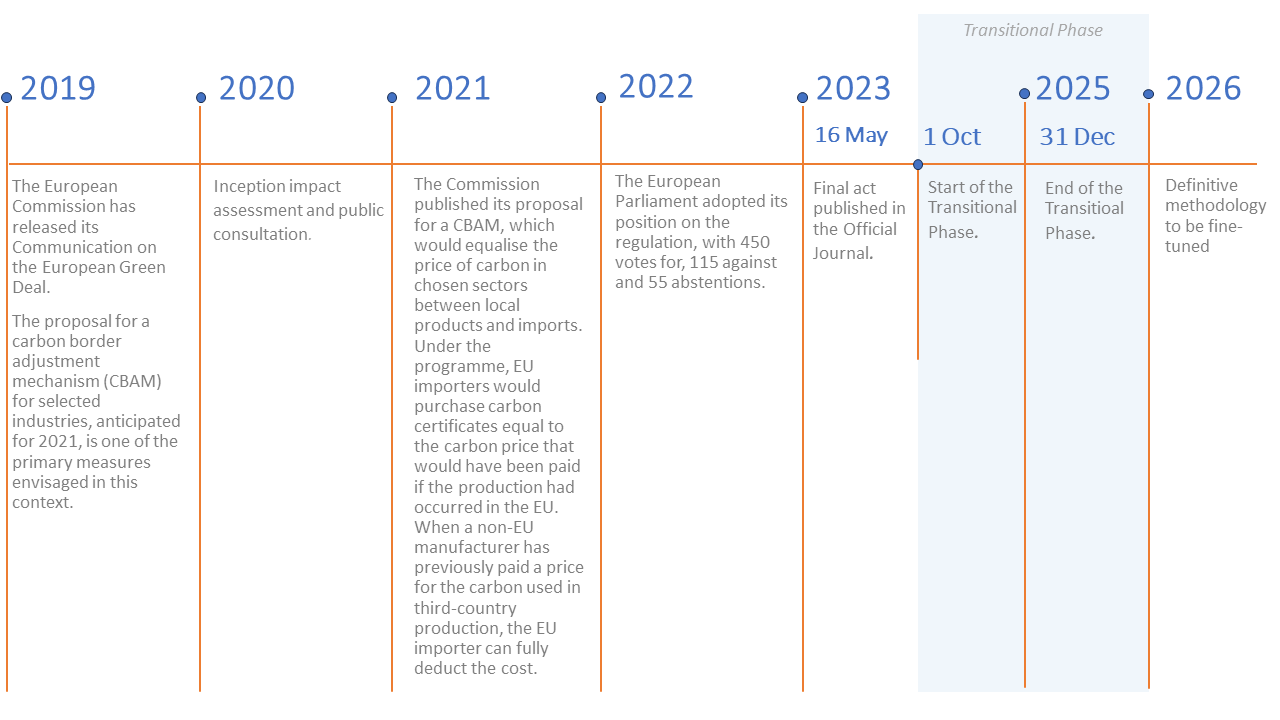EU Updates - September & October
Corporate Sustainability Moves Forward with the EU's Carbon Border Adjustment Mechanism (CBAM)
On 17 August, in a landmark move, the European Commission has adopted critical rules governing the implementation of the Carbon Border Adjustment Mechanism (CBAM) during its transitional phase, bringing Europe one step closer to achieving its ambitious climate neutrality goals. With the new measures, CBAM becomes a means to rectify the carbon pricing imbalances of the European Emissions Trading System (ETS). In its pursuit of industrial decarbonization, the ETS had inadvertently created a potential risk, also known as carbon leakage: the relocation of European companies’ manufacturing operations outside of the EU in order to escape the burdensome emissions regulations and associated costs. To counter this risk, the EU has employed free allocations to specific industries. However, as the bloc raised its climate ambitions, there is a compelling push to phase out these free allowances.
Figure 1: CBAM’s Legislative Procedure
As the CBAM officially enters its transitional phase - running from October 1, 2023, to December 31, 2025 - corporations and industries must prepare for a paradigm shift.
Notably, the CBAM will encompass a broader spectrum of items, including cement, electricity, fertilizers, iron, and steel, aluminium, hydrogen, and certain downstream products such as screws and bolts. The transition will see the gradual replacement of the EU ETS's free emission allowances with the CBAM between January 1sts 2026 and 2034, with decreasing rates: 2026: 2.5%; 2027: 5%; 2028: 10%; 2029: 22.5%; 2030: 48.5%; 2031: 61%; 2032: 73.5%; 2033: 86%; 2034: 100%.
One of the most significant changes accompanying the CBAM is the introduction of stringent emissions reporting requirements. Starting in October this year, companies must begin tracking the carbon footprint associated with the goods they import. This data must be reported from January 2024 onwards and will be mandatory until the end of 2025. In the CBAM’s transitional phase, traders will only have to report on the emissions embedded in their imports subject to the mechanism without paying any financial adjustment. This will give adequate time for businesses to prepare in a predictable manner, while also allowing for the definitive methodology to be fine-tuned by 2026.
Lastly, importers must secure CBAM certificates, matching carbon pricing between EU and non-EU products. These certificates require detailed emissions data, including production and indirect emissions like electricity use. Covered sectors include high-emission industries and certain downstream products.
For more information
Contact Giorgia Miccoli
EU Affairs Senior Specialist
Commission to Propose Europe-Wide European Disability Card
On September 9th, the European Commission is poised to propose the widespread adoption of the European Disability Card across the Union's Member States. The proposal stems from the EU’s Strategy for the Rights of Persons with Disabilities 2021-2030 and builds upon the positive outcomes derived from an ongoing pilot project currently underway in eight Member States: Belgium, Cyprus, Estonia, Finland, Italy, Malta, Slovenia, and Romania.
Since 2016, the European Disability Card has provided an easy, physical way to recognise disability status when travelling in the EU and granted associated benefits to card-holders, usually on cultural, sports, and leisure activities. Moreover, the card encourages businesses and institutions to cater to the needs of the disabled community, breaking down barriers and promoting universal accessibility. Currently, only residents of the aforementioned eight countries have the privilege of requesting the European Disability Card. However, should this proposal secure approval, it could potentially empower millions of individuals with disabilities across Europe to fully engage in society.
For more information:
Contact Giorgia Miccoli, EU Affairs Senior Specialist
New Commission’s Measures to Support SMEs and Income Taxation
Ahead of the conclusion of its 2023 work plan on September 12th, the European Commission has adopted two crucial measures to strengthen the European Union's economic landscape: the revision of the Late Payment Directive and the Business in Europe Framework for Income Taxation ("BEFIT").
Revision of the Late Payment Directive
In response to the unprecedented challenges posed by economic disruptions and the COVID-19 pandemic, the European Commission has rolled out a comprehensive SME Relief Package, demonstrating its commitment to supporting small and medium-sized enterprises (SMEs) across the region.
The SME Relief Package is a multi-faceted initiative that combines financial assistance, regulatory flexibility, and business support programs. Through targeted grants, low-interest loans, and liquidity provisions, the package aims to alleviate the financial strain faced by SMEs and help them weather the storm.
The planned revision will take a more holistic approach, centred on three pillars: embedding prompt payment behaviour into law; fostering the use of modern digital payment tools to facilitate prompt payments; and strengthening prevention and enforcement of these rules across all industrial ecosystems.
Business in Europe: Framework for Income Taxation ("BEFIT")
This new framework for EU corporate taxation should introduce “a common set of rules for EU companies to calculate their taxable base while ensuring a more effective allocation of profits between EU countries, based on a formula.” In other words, through BEFIT the Commission aims to overcome the complexity and high costs that businesses - particularly those with cross-border operations - experience as a result of having to comply with 27 separate corporate tax systems when doing business throughout the EU.
Interested in working with leading companies to set the next frontier of corporate tax transparency? Join CSR Europe's dedicated collaborative platform. Platform members – including Enel, Fortum, Grundfos, Vattenfall, Ørsted – led by CSR Europe in partnership with the Fair Tax Foundation are working together towards the development of a tax index aimed at assessing companies’ performance on tax transparency and responsible tax behaviour.
For more information:
EU Affairs Senior Specialist





